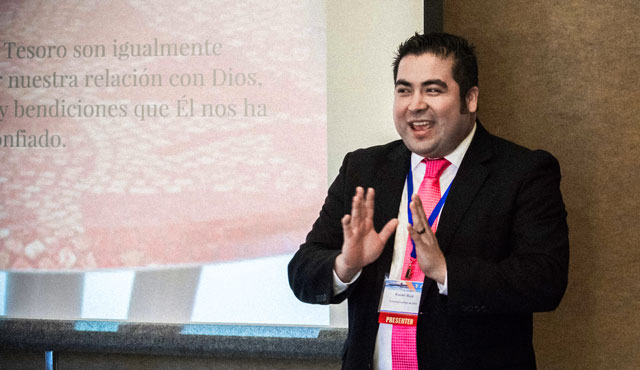With more than 1.2 million Catholics, the Diocese of Orange is the 12th largest in the nation, and as a reflection of the shifting demographics in California, the number of Spanish-speaking parishioners in Orange County is increasing.
“As an estimate, more than 50 percent of regular Mass attendees at Spanish and English Masses in the Diocese are Spanish-speakers,” says Debbie Leaverton, director of Parish Stewardship Education and Pastoral Services Appeal for the Orange Catholic Foundation (OCF), the fundraising and grant management organization for the Diocese of Orange.
With those demographics, OCF turned to Koren Ruiz, founder of Corresponsables de Dios (Stewards of God), to partner with and launch a Latino Stewardship program to educate Spanish-speaking parishioners about the importance of stewardship.
With Catholic parishes throughout the U.S. as clients, Corresponsables de Dios has worked with parishes to implement programs and services in the areas of stewardship and planned giving, focused mainly on the Latino community.
Ruiz, who was born and raised in Mexico, says that the concept of stewardship is new to the Latino community, but with a targeted, culturally specific education campaign, parishes can increase engagement with their Spanish-speaking population.
“There is not even a term for ‘stewardship’ in Spanish,” Ruiz says. In the past, the Spanish word for discipleship, “discipulado,” was used, but Ruiz says he prefers “co-responsiblidad,” the word used by the U.S. Council of Catholic Bishops.
“The word can mean so many different things, so the idea is to educate the Latino community on the understanding of the new word and what that concept is,” Ruiz says. “We Latinos are generous with our time and talent, and are very spiritual, but now it’s time to bring in the last ‘t’ — the treasure part.”
Three pilot programs were launched at parishes with large Spanish-speaking populations: Mission Basilica San Juan Capistrano, St. Anthony Claret in Anaheim and St. Anne in Santa Ana.
Ruiz works with the lay leadership of the parishes first, spending about five months training and educating them about what it means to be a good steward. When parish lay leaders become models of good stewardship practices, it will inspire and motivate others to do the same thing, he says.
“There are things that Latinos do that make them good stewards of their church, but there are things done in English-speaking communities not done in Latino communities,” Ruiz says. “Planning gifts, making pledges and intentionally giving for a period of time, the use of envelopes or electronic payment—these are things not necessarily in the culture.”
Ruiz uses cultural references and his own personal stories growing up in a Latino culture where many use their parents as models for giving to the Church.
“Stewardship should be a way of life,” Ruiz says. “Whatever we do our kids will do the same thing when they grow up.”
At St. Anthony Claret, about 70 percent of parishioners are Latino, says Pastor Fr. Bill Cao. The program was launched in January, with Ruiz training and forming leaders from St. Anthony Claret’s different ministries.
Fr. Cao believes the program was worthwhile; they have received about 380 stewardship commitments through the program. Now lay leaders who were trained are in the process of following up with those who have committed to the program.
“People were open to it,” says Fr. Cao. “It was something that was new to them, but the training formalized stewardship in a way that people can understand. We hope to have stewardship commitments increase each year.”
Ruiz says pastors are often pleased with the shift in mindset about stewardship after implementing the program.
“We try to educate, motivate and inspire, to give them a strong sense of belonging so they may finally invest in their home parish,” Ruiz says. “This isn’t just about time, talent and treasure, but about supporting the mission of the Church.”

